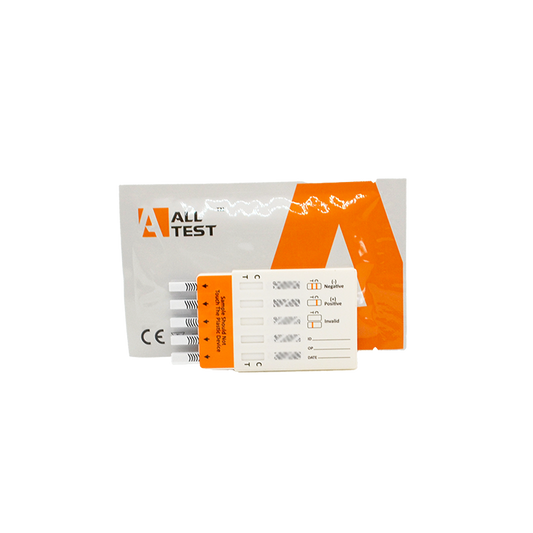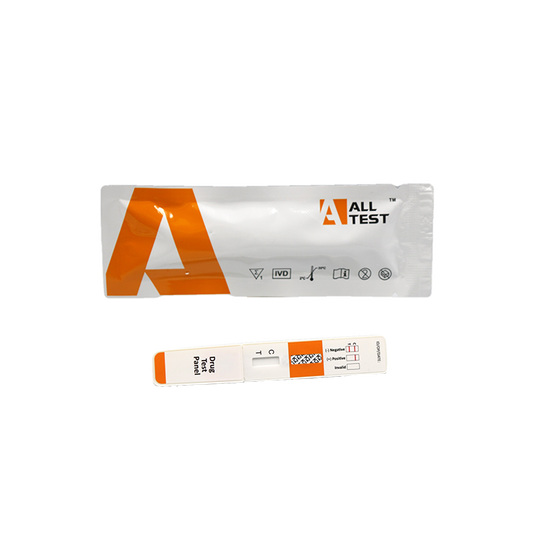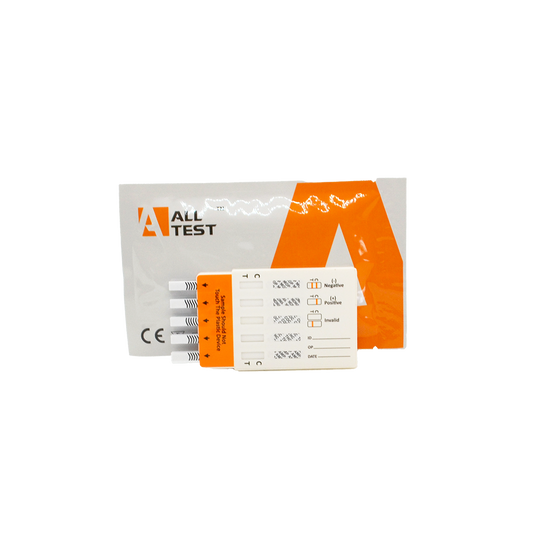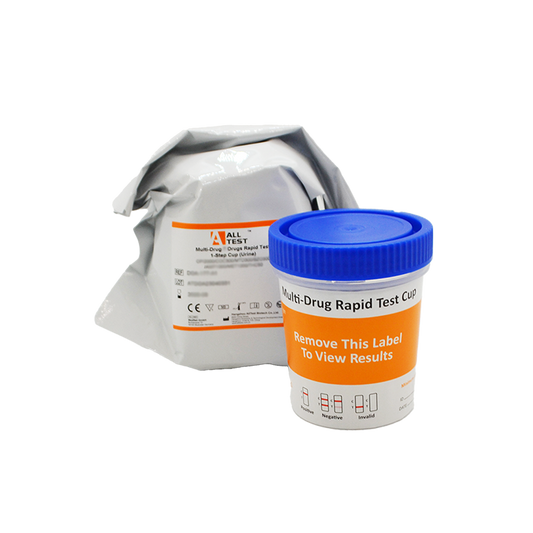Quick Summary - Testing for Cocaine (Coke/Crack)
Cocaine use in the UK has become a pressing public health issue, impacting individuals, communities, and healthcare systems. With an increase in usage, drug testing has become an essential tool for early detection and harm reduction. We offer multiple cocaine testing devices including a saliva cocaine test kit however we would recommend the cocaine urine test strip for its ease of use and affordable pricing.

Urine Drug Test Strip (Cocaine)
From £4.95 GBP
How Common is Cocaine Use in the UK?
Cocaine is one of the most widely used illicit drugs in the UK. Recent reports from the UK Home Office indicate a rise in cocaine consumption, with around 2.6% of adults aged 16-59 using the drug in the past year. This highlights the widespread nature of cocaine use, especially among younger adults.
Drug testing has become a vital tool for employers, healthcare providers, and law enforcement to identify and manage cocaine use. Various methods, including hair follicle tests, urine tests, and oral swabs, are used to detect cocaine. The choice of test depends on the detection window and level of accuracy needed.
What Are the Main Causes of Cocaine Use in the UK?
The rise in cocaine use can be attributed to several factors, including societal influences, economic pressures, and the thriving nightlife culture. Additionally, the accessibility and affordability of cocaine (£60/g - £100/g) have contributed to its popularity, particularly among young professionals and social circles.
Drug testing is an important step in addressing these trends, as it can help identify users and encourage early intervention. For workplaces, regular drug testing helps ensure a safe, productive environment while deterring drug use among employees.
How Does Cocaine Use Impact Health in the UK?
Cocaine use has significant short- and long-term health consequences. In the short term, it causes euphoria, heightened alertness, and energy, but these effects are often followed by anxiety, paranoia, and cardiovascular risks. Chronic use can lead to severe health problems, including addiction, respiratory issues, and mental health disorders.
Drug testing plays a crucial role in detecting cocaine use early, allowing healthcare professionals to intervene before the user experiences irreversible damage. Tests like hair follicle analysis can provide a longer detection window, revealing chronic use patterns and enabling better treatment planning.
Why is Drug Testing Important for Preventing Cocaine Abuse?
Drug testing is a crucial measure in preventing cocaine abuse, both in the workplace and in personal settings. For employers, testing ensures a drug-free environment, promoting safety and productivity. Schools, healthcare providers, and rehabilitation centers also rely on drug testing to identify individuals at risk of substance abuse.
Common drug testing methods include:
- Urine tests, which are effective in detecting recent cocaine use (3-6 days).
- Oral swab tests, which offer a non-invasive way to detect recent use (24-48 hours).
- Powder Tests which offer a reliable method for analysing a suspected substance or testing a surface that may have come into contact with drugs.
How long does Cocaine stay in system for a roadside drug test?
n the UK, roadside drug tests typically check for the presence of cocaine or its metabolites (specifically benzoylecgonine) in saliva or urine.
The detection times for Cocaine on a drug test depend on the type of drug test used:
Saliva Drug Test
- Cocaine: Detectable for up to 24 hours after use.
- Benzoylecgonine (metabolite): May also be detectable within this window, but it clears from saliva relatively quickly.
Urine Drug Test (used in further testing)
- Cocaine: Detectable for about 1-2 days.
- Benzoylecgonine: Detectable for 2-4 days (or longer for heavy or chronic users).
Key factors that influence detection times of Cocaine on a drug test in UK
- Amount Used: Higher doses of Cocaine can stay detectable longer.
- Frequency of use: Chronic users may retain metabolites for a longer period.
- Metabolism: Faster metabolisms eliminate substances more quickly.
- Hydration: Dehydration may increase concentration of Cocaine metabolites.
- Sensitivity of the drug test used: newer ultra sensitve Cocaine drug tests can detect lower levels of Cocaine in an individuals system.
- Type of Cocaine drug test used: Cocaine will be detected for longer on a urine test than on a saliva test.
What Are the Challenges in Cocaine Drug Testing?
While drug testing is essential, it comes with challenges. False positives, contamination, and variations in individual metabolism can affect test results. To ensure accurate outcomes, it's important to use high-quality, validated tests and to rely on accredited laboratories.
Choosing the right drug testing method, whether it's a home test kit or a professional lab service, helps overcome these challenges. For businesses, transparency and clear communication about testing policies are key to maintaining ethical practices.
How Can Early Cocaine Detection Lead to Better Health Outcomes?
Early detection of cocaine use can significantly improve health outcomes by enabling timely intervention and treatment. Whether through testing a suspected powder or surfaces that may have been in contact with the drug, identifying cocaine use at an early stage helps healthcare professionals, families, and individuals address addiction before it progresses further. Early intervention can reduce the risk of long-term damage to vital organs, such as the heart, liver, and brain, which cocaine abuse can heavily impact.
Testing suspected powders or contaminated areas offers a non-invasive and efficient method to detect the presence of cocaine. This can be crucial in various settings, including workplaces, schools, and even in personal environments, where individuals may be at risk. By identifying cocaine exposure early, appropriate steps can be taken to address the situation, whether it involves counseling, medical treatment, or support for recovery.
Moreover, early detection helps reduce the societal and economic impacts of drug abuse, such as lost productivity, legal issues, and healthcare costs. It can also prevent accidental overdoses, as prolonged cocaine use can lead to increasingly dangerous health complications. By prioritising early detection, individuals can seek help sooner, improving their chances of successful recovery and leading to healthier, more sustainable lifestyles.
Cocaine use continues to be a significant issue in the UK, with rising consumption driven by various social and economic factors. Drug testing is a critical tool in addressing this challenge, enabling early detection and intervention. Whether for workplace safety, healthcare monitoring, or addiction recovery, reliable drug tests like urine tests, hair follicle tests, and oral swabs are essential for tackling the issue. Investing in drug testing not only helps reduce the harm caused by cocaine but also supports overall public health and safety.





